Holy Roman Emperor (Francis II) then Emperor of Austria (Francis I)
Pronunciation:
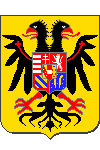
François de Habsburg-Lorraine was born on February 12, 1768 in Florence [Firenze] , Tuscany. He is the son of the future Holy Roman Emperor Leopold II (1747-1792), who at that time was governing the Duchy of Florence, and his wife Maria Luisa of Borbon (1745-1792), daughter of King Charles III of Spain.
The education he received reinforced the negative tendencies of his temperament. He lacked generosity, hated anything new and was naturally inclined to listen only to the voice of cold reason of state.
The young sovereign came to power by becoming Emperor of the Holy Roman Empire, under the name of Francis II, on March 1, 1792.
Times were difficult. His father Leopold II had only just repaired the harmful consequences of the reforming desire of his predecessor, Joseph II. New ideas were setting Europe ablaze. Francis, upon his accession, chose to champion the counter-revolution.
He accepted without hesitation the war against France, while strengthening the bureaucracy, censorship and police in his states. His regime was characterized by the most rigid conservatism. The rare Austrian and Hungarian Jacobins were mercilessly pursued.
If he achieved successes within his borders, Francis II accumulated failures abroad. Louis XVI, his uncle by marriage, was executed, then his aunt, Marie-Antoinette. His armies suffered defeat after defeat, in the Netherlands, Germany and Italy. In 1797, he had no other resource to stop Bonaparte's march on Vienna than to sign the Treaty of Campo-Formio. This deprived Austria of all rights over Belgium.
This did not prevent Francis II from continuing to participate in all the coalitions forged by England against France. Crushed at Austerlitz (December 2, 1805), he saw his capital, Vienna, taken for the first time. The Treaty of Pressburg (July 12, 1806) imposed heavy sacrifices on him and stripped him of his title of Germanic Emperor. Francis II, Emperor of Germany, was now only Francis I, Emperor of Austria, a title taken two years earlier, on August 11, 1804. The result was the decline of Habsburg influence on German political life.
Francis I tried to obtain his revenge in 1809, thanks to the difficulties encountered by France in Spain. Its capital, Vienna, was again occupied and its armies defeated at Wagram (July 5 and 6). This time he had to offer his daughter's hand to the winner and then to assist him in his Russian adventure.
The wheel finally turned from 1813. The Congress of Vienna in 1815 was a triumph for the Emperor of Austria and his chancellor, Clemens von Metternich, as conservative as he was. Europe was rebuilt according to dynastic principles. The heavy lid of the Holy Alliance fell for thirty years on liberal aspirations.
During the following twenty years, Francis I did not know how to benefit from his victory. He wanted neither to re-establish the Germanic Empire, nor to bring about German unity for his benefit, nor to create a truly effective government in his states, nor to arouse Austrian national sentiment. His government, by idealizing immobility, paralyzed itself.
Francis I passed away on March 2, 1835 in Vienna.
"Francis I of Austria" painted circa 1832 by Friedrich von Amerling (Vienna 1803 - Vienna 1887).
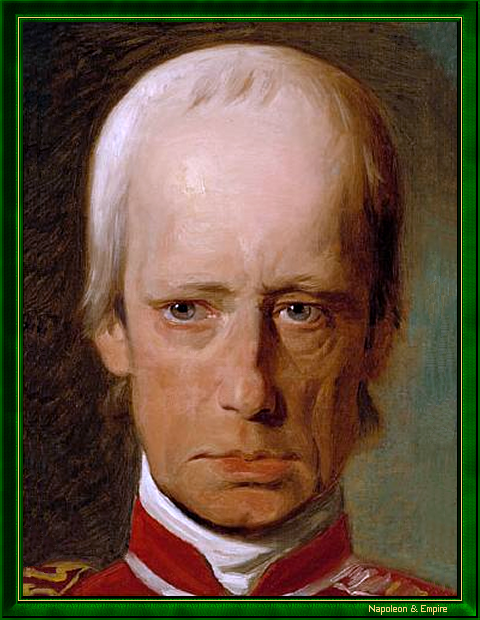
He married Elizabeth-Wilhelmina von Württemberg in 1788, Maria Theresa of Bourbon-Sicily and Naples in 1790 (with whom he had four sons and eight daughters, the elder being Archduchess Marie-Louise, who married Napoleon Bonaparte in 1810), Maria Luisa von Habsbourg-Lothringen-Este in 1808, and Caroline Augusta of Bavaria in 1816.
Other portraits
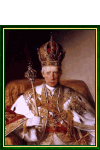
Enlarge
"Francis I of Austria in Emperor robes (detail)" by Friedrich von Amerling (Vienna 1803 - Vienna 1887).
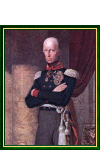
Enlarge
"Kaiser Franz I. (detail)". German school of the nineteenth century.
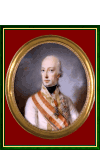
Enlarge
"Emperor Francis II" by Josef Kreutzinger (Vienna 1757 - Vienna 1829).
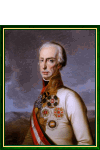
Enlarge
"Kaiser Franz I. von Österreich" by Adalbert Suchy (Klattau, Bohemia 1783 - Vienna 1849).